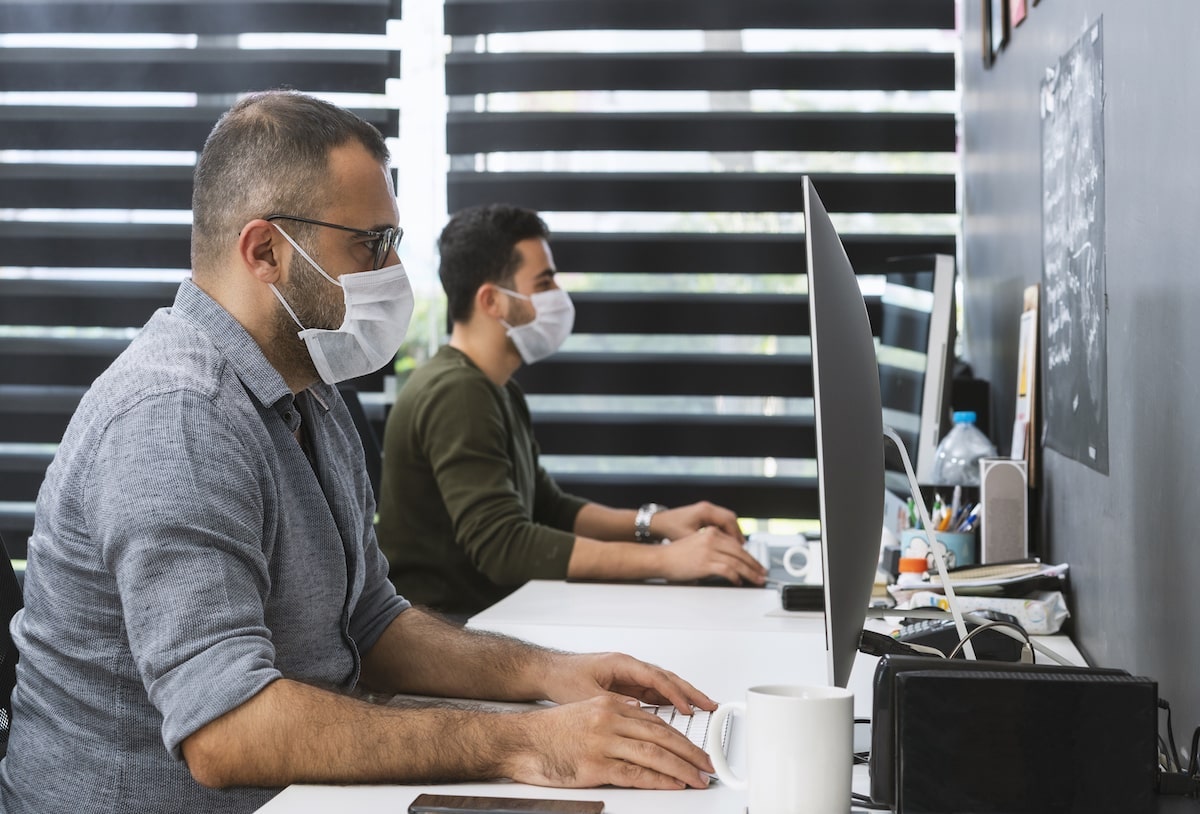What will it look like when small businesses in Connecticut go back to work? Recommendations from the state and the Centers for Disease Control and Prevention show what’s coming, including more telecommuting, flexible hours and routine environmental cleaning.
Connecticut Gov. Ned Lamont’s four-step plan, announced April 30, starts with the reopening of business previously classified as nonessential.
These businesses will be allowed to open, with some restrictions, on May 20:
- Restaurants (outdoor only, no bar areas).
- Remaining retail offices (continue work from home where possible).
- Personal services (hair & nail only).
- Museums, zoos (outdoor only).
- Additional outdoor recreation (such as camping and mountain biking).
- University research programs.
Lamont, who said 60 percent of the state’s economy has functioned during the pandemic, placed these conditions on the May 20 reopening:
- 14-day decline of hospitalizations.
- Increased testing available.
- Sufficient contact-tracing capacity.
- Adequate protection of high-risk populations.
- Adequate healthcare capacity.
- Adequate supply of personal protective equipment (PPE).
- Appropriate physical distancing regulations.
The remaining stages, which include gradual easing of restrictions, have not been determined. But Lamont said the final, least-restrictive stage might be 10 months away.
Several news outlets reported the CDC sent draft guidance to Washington this week that outlined a reopening plan for:
- Child care programs: Closed in some areas, but open in others for children of essential workers, such as healthcare workers.
- Schools and day camps: Schools now closed should remain closed but continue school meal programs. Summer camps initially restricted to children of essential workers, then accepting children or local residents only.
- Faith, worship: A suggestion to initially limit gatherings to those streamed online or held virtually.
- Businesses with vulnerable workers: Employees over 65 years old and those with existing medical conditions.
- Restaurants and bars: Remain closed except for drive-through, curbside takeout or delivery.
- Mass transit: Users initially restricted to essential critical infrastructure only. In subsequent phases, social distancing required between passengers and employees, then maintaining social distancing as much as possible.
Here are the CDC’s Top 10 tips to protect employee health:
- Actively encourage sick employees to stay home. Develop policies that encourage sick employees to stay at home without fear of reprisals, and ensure employees are aware of these policies.
- Have conversations with employees about their concerns. Some employees may be at higher risk for severe illness, such as older adults and those with chronic medical conditions.
- Develop other flexible policies for scheduling and telework (if feasible) and create leave policies to allow employees to stay home to care for sick family members or care for children if schools and childcare close.
- Talk with companies that provide your business with contract or temporary employees about their plans. Discuss the importance of sick employees staying home and encourage them to develop non-punitive “emergency sick leave” policies.
- Promote etiquette for coughing and sneezing and handwashing. Provide tissues, no-touch trash cans, soap and water, and hand sanitizer with at least 60 percent alcohol.
- Plan to implement practices to minimize face-to-face contact between employees if social distancing is recommended by your state or local health department. Actively encourage flexible work arrangements such as teleworking or staggered shifts.
- Perform routine environmental cleaning. Routinely clean and disinfect all frequently touched surfaces, such as workstations, countertops, handrails, and doorknobs. Discourage sharing of tools and equipment, if feasible.
- Consider the need for travel and explore alternatives. Consider using teleconferencing and video conferencing for meetings, when possible.
- Provide education and training materials in an easy to understand format and in the appropriate language and literacy level for all employees, like fact sheets and posters.
- If an employee becomes sick while at work, they should be separated from other employees, customers, and visitors and sent home immediately. Follow CDC guidelines for cleaning and disinfecting areas the sick employee visited.
The CDC also cautions small business to expect “significant absenteeism, supply chain disruptions or changes in the way you need to conduct business.”
Connecticut’s “Safe Workplace Rules for Essential Employers” also could preview what work life might look like in the state. Employers, for starters, must provide these essential employees masks. If they can’t, they must either reimburse employees for purchased masks or provide materials and a CDC tutorial on making a cloth mask.
Also:
- Social distancing: Expect a lot of meetings by teleconference. In-person meetings are limited to 10 people, each wearing a mask.
- Increased physical space between employees.
- Multiple work shifts.
- Controlling contact between employees and other employees or customers.
- Reduction in the number of people allowed in a break room to conform with social distancing.
- Rotating lunch and other break shifts.
- Leaving office doors open to reduce common touch points.
- Frequent cleaning of all touch points.
- Employees traveling separately to and from, and within, worksites.
Not feeling well? Call your healthcare provider for guidance and try to avoid going directly to an emergency department or urgent care center, as this could increase the chances of the disease spreading.
Need to see your doctor? New Patient? For more information about Hartford HealthCare virtual health visits, click here.
Click here to schedule a virtual visit with a Hartford HealthCare-GoHealth Urgent care doctor.
Stay with Hartford HealthCare for everything you need to know about the coronavirus threat. Click here for information updated daily.
Questions? Call our 24-hour hotline (860.972.8100 or, toll-free, 833.621.0600).
Get text alerts by texting 31996 with COVID19 in the message field.

